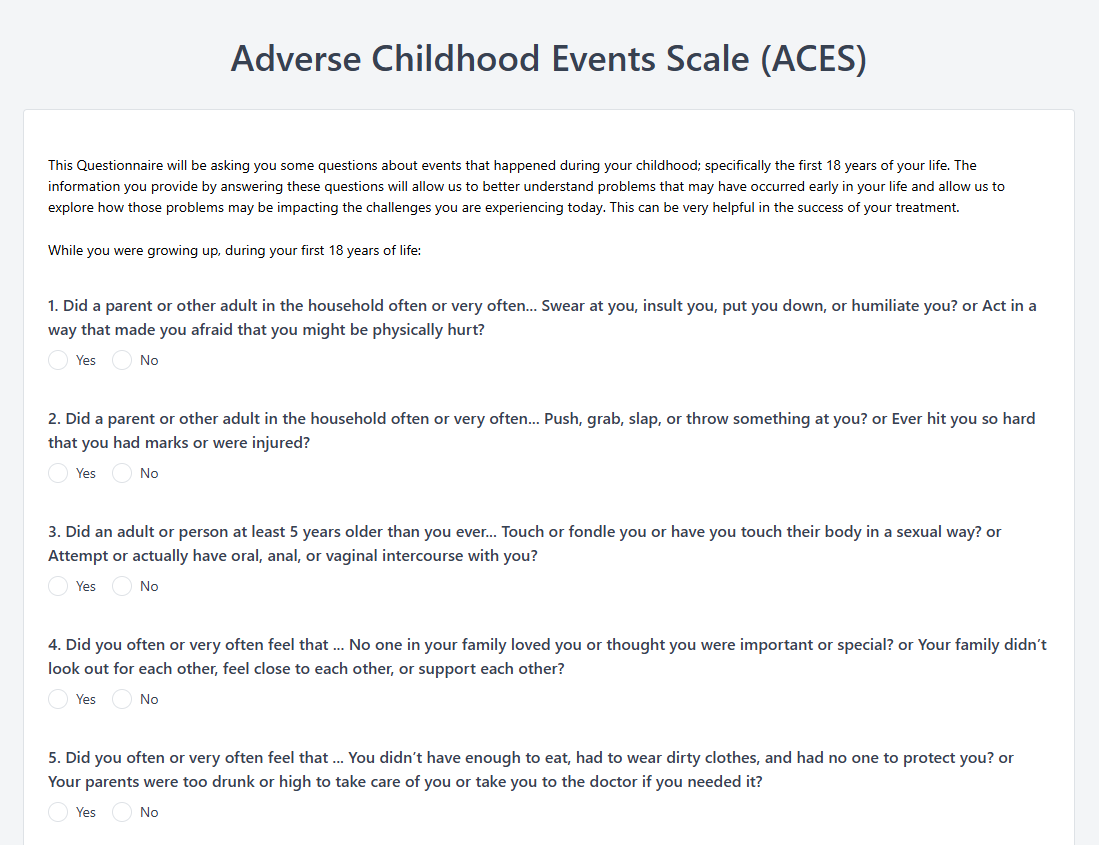

The Adverse Childhood Events Scale (ACES) is a vital tool used to identify and understand the impact of childhood trauma on long-term mental and physical health. With Zentake’s HIPAA-secure digital platform, healthcare providers can streamline the assessment process, ensuring accuracy, efficiency, and patient confidentiality. Get started today to modernize your trauma screening workflows.
The Adverse Childhood Events Scale (ACES) is a standardized assessment tool designed to measure exposure to traumatic experiences during childhood. Originally developed by the Centers for Disease Control and Prevention (CDC) and Kaiser Permanente researchers in the late 1990s, the ACES questionnaire evaluates ten categories of adverse experiences, including abuse, neglect, and household dysfunction.
The ACES is typically composed of 10–11 yes/no questions, each representing a specific traumatic experience. Respondents’ answers are scored to generate an ACES score, which quantifies the cumulative effect of childhood adversities. Higher scores are correlated with increased risk for mental health challenges, chronic disease, and behavioral difficulties in adulthood.
ACES assessments are critical for clinicians and researchers seeking to identify high-risk populations, inform treatment plans, and track outcomes over time.
Why ACES matters in clinical practice
Understanding a patient’s history of childhood trauma is essential for delivering comprehensive care. Childhood adversity can influence mental health, substance use, chronic disease risk, and overall well-being, making early identification through ACES crucial.
By incorporating ACES assessments, clinicians can identify previously unrecognized risk factors, enhance patient communication, and improve health outcomes. Digital administration of the ACES form reduces administrative burden, improves scoring accuracy, and enables seamless integration into electronic health records.
Traditional ACES forms rely on paper questionnaires, which require manual distribution, scoring, and secure storage. This process is prone to errors, inefficiencies, and potential privacy risks. In contrast, Zentake’s digital ACES solution transforms the workflow:
Before and after Zentake: A clinic using paper ACES forms faced delays in scoring and data entry. After switching to Zentake, assessments were automatically scored, stored securely, and integrated into patient records—saving staff hours weekly while enhancing patient confidentiality.
Zentake’s digital platform is designed to modernize trauma assessment workflows, providing benefits beyond standard paper forms. Key features include:
Example scenario:
A mental health clinic implements Zentake to automatically distribute the ACES questionnaire before new patient appointments. Scores are immediately calculated and flagged for clinicians, allowing targeted intervention during the first session, without additional administrative work.
Implementing ACES digitally in a practice requires a structured approach:
Studies show that clinics adopting digital assessments save up to 40% of administrative time, allowing clinicians to focus on patient care rather than paperwork. Using Zentake also ensures standardized scoring, reducing variability and improving data quality.
Q1: Who can use the ACES form?
The ACES form is suitable for use in clinical, research, and public health settings for patients above the age of 18. It can be administered by licensed healthcare providers, researchers, and trained clinical staff.
Q2: How long does it take to complete the assessment?
The ACES questionnaire typically takes 5–10 minutes to complete, making it feasible for routine clinical use.
Q3: Is the ACES scientifically validated?
Yes, the ACES questionnaire is widely validated and referenced in numerous studies linking childhood adversity to health outcomes.
Q4: Can I export results?
Zentake allows secure export of ACES scores and patient data in multiple formats for clinical reporting, research, or integration with electronic health records.
Q5: How does Zentake protect patient privacy?
All data collected through Zentake is encrypted and stored in HIPAA-compliant servers, with audit trails to ensure secure access and compliance.